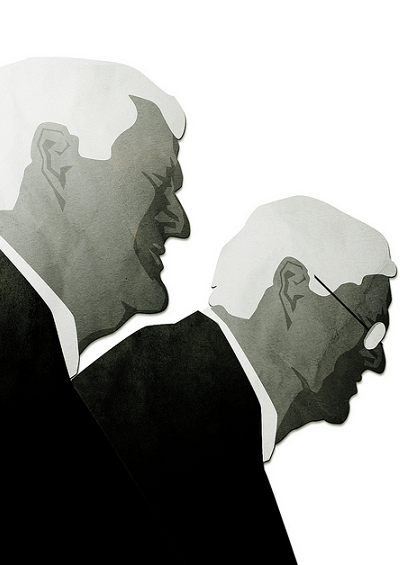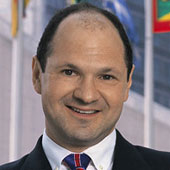Trump Vs. the Koch Brothers
Are the Koch brothers going to be devoured by the very same radical forces on the right-wing of Republican politics that they helped spawn?
August 7, 2018

Trump followers are often referred to as conservatives. That is a misnomer. They are revolutionaries motivated by a radical right-wing ideology. Like all extremists, they accept only the purest form of ideology, without deviations.
In such a political framework, only the Supreme Leader can define purity. There is no room for other leaders or different party lines. This is notably also why revolutions end up devouring their own children.
The super-rich Koch brothers, longtime financial makers of the political fortunes of Republican candidates across the United States, are only the latest heretics to be burned at the stake.
The Koch brothers didn’t provide financial support to Trump in the 2016 election. That was remarkable insofar as the Koch organization’s financial muscle was key in stirring up the right-wing revolution across the United States.
It saturated the U.S. media landscape with right-wing propaganda and got right-wingers elected to the U.S. Congress and to local governments. It also spent hundreds of millions to ensure that American democracy did not stand in the way of private sector interests.
Promoting climate change denial
In that context, the Koch brothers are the ones most responsible for promoting climate change denial. They did so by sowing doubt in the validity of all science.
This categorical move has had remarkable spillover effects. It has led to questioning expertise and professionalism in general, in all spheres of American life.
The upshot of this mindset, encouraged by the propaganda machine the Koch brothers financed, helped create the post-truth environment and, ultimately, made the fake war on “Fake News” possible.
Waging war on taxes
To serve their material interests, the Koch brothers also waged a broad-based war on taxes. They supplemented this campaign by financing a propaganda machine dedicated to denigrating government and the common good in general.
As politicians, financed and aided by the Koch organization, dutifully cut taxes, the government sector at the local, state and federal level was starved of funding. In many places, it is no longer able to provide basic public sector services, whether for the — always very lean — social safety net, assistance with education, health care or infrastructure.
Cynically, the Koch propaganda machine presented these results, which it actively instigated by tying campaign financing to such cutbacks after politicians got elected, as a failure of the public sector in general. This was done in order to turn American public opinion against public spending in general and public servants in particular.
Finally, in their fight against “tax and spend” liberals, the Kochs encouraged class warfare and systematically exacerbated divisions in American society.
They were by no means alone — other like-minded rich people and businessmen such as Rupert Murdoch and the Mercers, also cynically promoted right-wing radicalism. However, the Kochs were the most active, the most generous and the most visible.
Trump the Duce
But now things have changed. In Donald Trump, right-wing radicals have found a charismatic Duce. His ideology is quite different from the Kochs’.
The Koch brothers are pro-business, which means they support market forces and international trade. And they are against taxes — which also makes them fiscally conservative. The form of government they would like to see in the United States is a kind of feudalist-capitalist regime.
Trump is different. He does agree with them on some ideological points. Like them, Trump is unquestionably a plutocrat. However, he is also a populist, plus an economic nationalist.
What is grating to the Kochs is that Trump has been amazingly successful in asserting his ownership of the GOP. Not one to tolerate anyone other than himself as the one to call the shots, Trump is attacking the Kochs.
What is amazing to observe is that the Republican political establishment is joining the fray, forgetting the past largesse of the Kochs and siding with Trump.
The historical context
In a broader historical context, the current Trump-Koch spat connects the President of the United States with Russia’s President at a deep, existential level.
Putin was brought to power by a group of Russian oligarchs (consider them Russian “Kochs”) who thought he would obediently do their bidding and promote their interests.
But Putin, like many an autocrat before him, had no intention to owe his position to anyone. Within three years of his rise to power three of the most powerful oligarchs who created him were in jail or in exile, and their businesses had been taken away from them.
For now, Kochs are merely being attacked by Trump on Twitter and bad-mouthed by the Republican establishment. Being in America, they can feel secure in preserving their wealth and their freedom. But that won’t keep Trump from stinging them wherever he can.
Moreover, history shows that one should never become overly confident in controlling the very forces one helped unleash oneself.
Takeaways
Trump followers are often referred to as conservatives. That is a misnomer. They are revolutionaries motivated by a radical right-wing ideology.
Are the super-rich Koch brothers going to be devoured by the very same radical forces on the right-wing of Republican politics that they helped spawn?
The Koch brothers, longtime financial makers of the political fortunes of Republican candidates across the US, are the latest heretics to be burned at the stake.
In their fight against “tax and spend” liberals, the Kochs encouraged class warfare and systematically exacerbated divisions in American society.
History shows that one should never become overly confident in controlling the very forces one helped unleash oneself.
